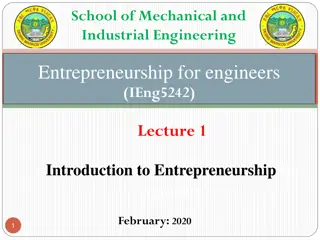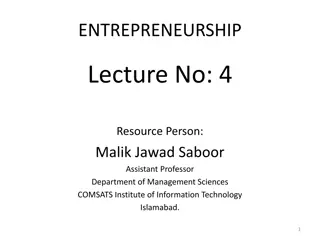Small Scale Industry Entrepreneurship Development Overview
Small Scale Industry encompasses Micro, Small, and Medium Enterprises (MSME) classified into Manufacturing and Service Enterprises. These enterprises play a vital role in the economy due to factors like low capital intensity, government support, and unique characteristics such as local operation and labor-intensive nature. Explore the opportunities and characteristics of Small Scale Industries for a comprehensive understanding of this sector.
Download Presentation

Please find below an Image/Link to download the presentation.
The content on the website is provided AS IS for your information and personal use only. It may not be sold, licensed, or shared on other websites without obtaining consent from the author.If you encounter any issues during the download, it is possible that the publisher has removed the file from their server.
You are allowed to download the files provided on this website for personal or commercial use, subject to the condition that they are used lawfully. All files are the property of their respective owners.
The content on the website is provided AS IS for your information and personal use only. It may not be sold, licensed, or shared on other websites without obtaining consent from the author.
E N D
Presentation Transcript
SMALL SCALE INDUSTRY Entrepreneurship Development
Micro , Small & Medium Enterprises MSME are classified in two Classes Manufacturing Enterprise Service Enterprise Manufacturing Enterprises- the enterprises engaged in the manufacture or production of goods pertaining to any industry specified in the first schedule to the industries (Development and regulation Act, 1951) or employing plant and machinery in the process of value addition to the final product having a distinct name or character or use. The Manufacturing Enterprise are defined in terms of investment in Plant & Machinery Service Enterprises:-The enterprises engaged in providing or rendering of services and are defined in terms of investment in equipment.
Small Scale Industries The opportunities in the small-scale sector are enormous due to the following factors: 1. Less Capital Intensive 2. Extensive Promotion & Support by Government 3. Reservation for Exclusive Manufacture by small scale sector
Small Scale Industries - Characteristics (i) Ownership: Ownership of small scale unit is with one individual in sole-proprietorship or it can be with a few individuals in partnership. (ii) Management and control: A small-scale unit is normally a one man show and even in case of partnership the activities are mainly carried out by the active partner and the rest are generally sleeping partners. These units are managed in a personalised fashion. The owner is activity involved in all the decisions concerning business. (iii) Area of operation: The area of operation of small units is generally localised catering to the local or regional demand. The overall resources at the disposal of small scale units are limited and as a result of this, it is forced to confine its activities to the local level. (iv) Technology: Small industries are fairly labour intensive with comparatively smaller capital investment than the larger units. Therefore, these units are more suited for economics where capital is scarce and there is abundant supply of labour.
Small Scale Industries - Characteristics (v) Gestation period: Gestation period is that period after which teething problems are over and return on investment starts. Gestation period of small scale unit is less as compared to large scale unit. (vi) Flexibility: Small scale units as compared to large scale units are more change susceptible and highly reactive and responsive to socio-economic conditions. They are more flexible to adopt changes like new method of production, introduction of new products etc. (vii) Resources: Small scale units use local or indigenous resources and as such can be located anywhere subject to the availability of these resources like labour and raw materials. (viii) Dispersal of units: Small scale units use local resources and can be dispersed over a wide territory. The development of small scale units in rural and backward areas promotes more balanced regional development and can prevent the influx of job seekers from rural areas to cities.
Small Scale Industries - Objectives 1. To create more employment opportunities with less investment. 2. To remove economic backwardness of rural and less developed regions of the economy. 3. To reduce regional imbalances. 4. To mobilise and ensure optimum utilisation of unexploited resources of the country.
Small Scale Industries - Objectives 5. To improve standard of living of people. 6. To ensure equitable distribution of income and wealth. 7. To solve unemployment problem. 8. To attain self-reliance. 9. To adopt latest technology aimed at producing better quality products at lower costs.
Challenges for MSME 1. 2. 3. 4. 5. 6. 7. 8. Technological obsolescence Financing problems High cost of credit Low access to new technology Poor adaptability to changing trends Lack of access to international markets Lack of skilled manpower Inadequate infrastructure facilities including power, water, roads, etc Regulatory issues related to taxation, labor laws, and environmental issues 9.
Public Procurement Policy and Market Linkages Public Procurement Policy for Micro and Small Enterprises from 1 April 2012 ; MSMED Act 2006 overall procurement of minimum 20% of the total annual purchases of products manufactured services rendered by MSMEs within a period of three years by central ministries, government departments and public sector undertakings (PSU). From 1 April 2015, the policy has also earmarked a sub-target of 4% out of the 20% notified for procurement of goods and services from MSMEs owned by SC/ST entrepreneurs.























